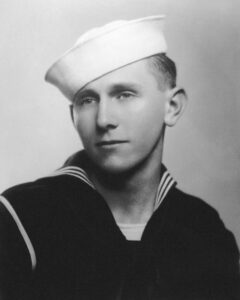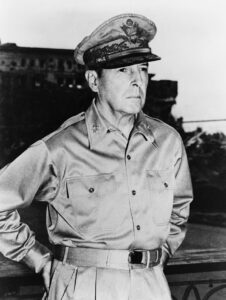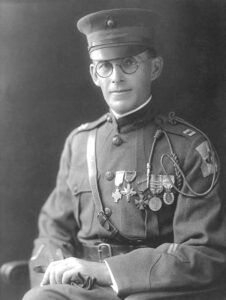
First Lieutenant, U.S. Army, Korean War
For his Medal of Honor action, then-First Lieutenant Ralph Puckett, Jr. distinguished himself while serving as the commander of the 8th U.S. Army Ranger Company on November 25 and 26, 1950, in Korea. During his action, Puckett led his small force of men through six assaults by hostile forces that outnumbered them ten to one. During the attacks, he was wounded multiple times by grenade and mortar fragments and refused evacuation. When their position was in danger of being completely overrun, he ordered his men to leave him behind. They disobeyed the order and retrieved him while under fire. Puckett served the nation for more than 50 years. He fought in Korea and Vietnam, earning the Distinguished Service Cross in each conflict, two Silver Stars, and five Purple Hearts among numerous military decorations. Puckett was an inaugural inductee into the Ranger Hall of Fame in 1992 and spent 12 years as the 75th Ranger Regiment’s honorary colonel. On May 21, 2021, his Distinguished Service Cross from the Korean War was upgraded to the Medal of Honor. President Joseph R. Biden presented Puckett with the award.
Biographical Information
Medal of Honor Action: November 25-26, 1950
Medal of Honor Awarded: May 21, 2021
Presenter: President Joseph R. Biden
Unit: 8th Ranger Company, 8213th Army Unit, 8th U.S. Army
Location of Action: near Unsan, Korea
Battle: Battle of the Ch’ongch’on River
Date of Birth: December 8, 1926
Place of Birth: Tifton, Georgia
Early Life
Puckett drew inspiration from the heroic exploits of World War I aviators and started his military career in the U.S. Army Air Corps Enlisted Reserve to become a pilot. As he studied at Georgia Tech, his pre-aviation cadet training progressed. However, World War II was winding down as he advanced through his preparations. With the pipeline full of trained aviators, the program was disbanded. Puckett tried to remain in service with the Air Corps, but after it became clear there would be no chance at flight training, he chose to take their offer of a discharge.
Puckett continued to study at Georgia Tech. His father approached their local congressional representative about getting him an appointment West Point, the United States Military Academy. At that time, West Point still trained airplane pilots, and Puckett still desired to become one. He secured the appointment, and by July of 1945, he became a member of the class of 1949. After graduating, Puckett would go on to take paratrooper training and earned his jump wings. During his first week of jump school training, North Korea crossed the 38th parallel and invaded South Korea. Puckett vowed that he “would not ‘miss out’ on this war. Somehow [he] would get to Korea.”
Activating the Rangers
As the Allied Forces held onto their defenses around the Pusan (modern: Busan) Perimeter, Puckett received orders to join the under-strength 24th Infantry Division. The 24th had taken a shellacking as the North Korean Army blitzed across the peninsula, suffering nearly a 50% casualty rate. Before going to Korea, he was called into headquarters and asked if he wanted to volunteer for a dangerous mission behind the lines in a Ranger company. Without hesitating, he volunteered and was chosen to command one of the assembling companies. Puckett was now a second lieutenant with no command or combat experience and in charge of one of the first Ranger units activated since World War II.
Once Puckett was given command, he received the go-ahead to begin recruiting for his company, which called for 74 infantrymen. While he welcomed this good news, the bad news came down that the situation at the Pusan Perimeter was so dire that he could not choose already-trained infantry. Most of his men who ended up volunteering for this dangerous duty already had safe rear-echelon jobs in Japan, but wanted to prove themselves. Though the Army was slow to integrate following Truman’s 1948 order, the Rangers headed for Korea were integrated from the start. Their ranks contained Whites, Hispanics, Nisei Japanese, and Blacks. By August 25, 1950, the Rangers were activated and began to get underway to South Korea. They spent the next month training to turn clerk-typists, cooks, and mechanics into combat-ready troops. By October 10, Puckett and his men were confident and ready.
“In my mind, race, ethnicity, religion, or region never counted for much; what mattered was what they had behind their belt buckles and between their ears. Did they have the guts and the brains to be Infantrymen and Rangers”
– Colonel Ralph Puckett, Jr.
Medal of Honor Action
November 25, 1950 was a frigid, clear day. Puckett and his Rangers had a mission: supported by a tank platoon, they would attack across 800 yards of open, frozen rice paddy to seize some land designated Hill 205 with approximately 50 men, a reinforced platoon. Their mission was part of the Battle of the Ch’ongch’on River, part of MacArthur’s “Home-by-Christmas Offensive.” The attack towards the Yalu risked the People’s Republic of China committing themselves fully to support North Korea. On November 25, Chinese forces began an offensive across the entire front, Puckett and his Rangers would be in combat with them that day.
Hostile fire rained down on the Rangers and the tanks as they approached their objective, and the tanks gave some fire before Puckett took charge leading his men in a counterattack. As they crossed the open rice paddies, some of them were wounded, but refused evacuation because they wanted to continue to fight. They fixed bayonets and advanced on the crest of the hill only to find it unoccupied. The hill secured, they started digging a perimeter around the hill in the frozen, rocky soil. Puckett knew that an attack by Chinese forces would be coming and plotted artillery support. The Allied Forces were under pressure, and the nearest American unit was over a mile away.
Digging in around the hill was only the start of their fight. They faced a battalion-sized force (approximately 500) of Chinese troops. At about 10 PM, the assault began. Hostile mortar fire rained down on their position, but the artillery support came through and halted the Chinese advance as the Americans poured small-arms fire on them. During this initial assault, a grenade fragment wounded Puckett in his thigh. The Chinese troops would attack the hill five more times. During the final attack, artillery support was unavailable because Chinese troops were attacking along the entire American line and the Rangers at Hill 205 were being overrun by the enemy. Amid the fight, two mortars exploded near Puckett, sending fragments into his feet, left shoulder, and left arm, leaving him with limited mobility. Helplessly, Puckett watched as hostile forces overwhelmed and killed some of his wounded men.
One of his remaining men, William L. Judy, came to check on him following the mortar explosions. He ordered them to leave him behind. Instead, Judy, unable to move Puckett himself, went and got help from Rangers Billy Walls and David Pollock. Walls asked if Puckett was okay; Puckett told him he was not and to leave him. Instead, Walls grabbed his officer. With Pollock providing covering fire and then helping move him, they dragged him to safety. They managed to reach the tanks they had moved away from the previous night, and Puckett requested artillery fire. Soon the hill was under a barrage, the wounded were loaded into the tanks, and the entire force fell back. Sixty percent of the Rangers who arrived at Hill 205 ended up as casualties. Puckett had to be evacuated to the United States and would spend a year recuperating from the wounds he sustained in the battle. In 1951, he would be awarded the Distinguished Service Cross for his actions on November 25 and 26.

Later Life
Puckett returned to active duty in late 1951 with the Infantry School Ranger Department. He spent a year in South America, organizing, establishing, and supervising a Ranger School for the Colombian Army. In 1967-68, he commanded three different battalions of the 101st Airborne Division during Vietnam. During the Tet Offensive in 1968, he served as acting commander of the division’s 1st Brigade. His service in Vietnam would see him wounded by another grenade which shattered his eardrums and almost killed him. He would also earn another Distinguished Service Cross for valor while serving as Commanding Officer of an airborne infantry battalion on combat operations near Duc Pho.
Retiring from active duty in 1971, he became the National Programs Coordinator of Outward Bound, Inc., an “experiential” wilderness program for the development of personal growth, management skills, and teamwork. He subsequently established Discovery, Inc., a leadership and teamwork development program that focused on “Personal Growth through Safe Adventure.” Puckett also founded The Bottom Line, a management consulting company. In 1992, he became one of the 23 charter inductees of the Ranger Hall of Fame.
From 1996 to 2006, he served as the first Honorary Colonel of the 75th Ranger Regiment. Other honors followed to include an appointment as an Ambassador of Goodwill by the Western Hemisphere Institute for Security Cooperation, selection as a 2004 Distinguished Graduate of the United States Military Academy, and a 2007 receipt of the Infantry’s Doughboy Award. Additionally, the Colonel Ralph Puckett Leadership Award was created to recognize junior officers who have demonstrated the ability to “take charge leadership” in demanding circumstances where their personal actions clearly made a difference in the outcome of events.
In May of 2021, his Distinguished Service Cross from Korea was upgraded to the Medal of Honor in a ceremony where he received the award from President Joseph R. Biden.
Learn More about Ralph Puckett Jr.
Media




